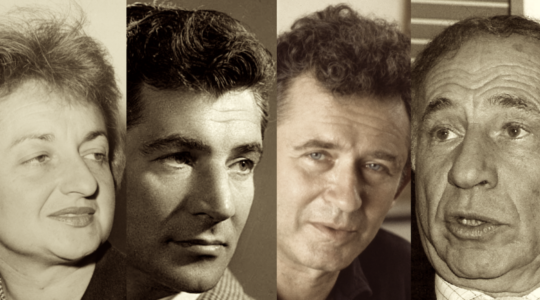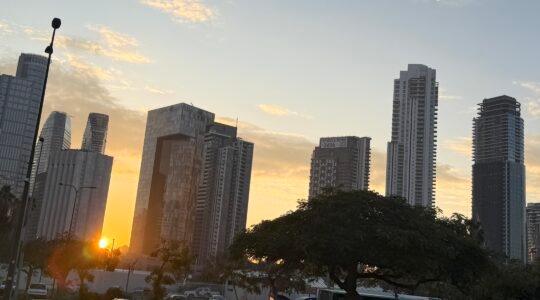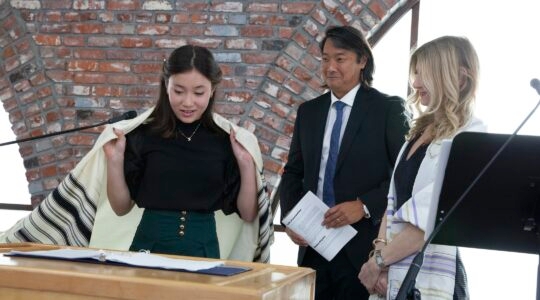I have no doubt that if the Maccabees, heroes of the Chanukah story, were around today, they would be leading the West Bank settlers’ current protests, decrying the Jerusalem government for abandoning its Zionist and religious imperative to claim all of the land of Israel as holy and non-negotiable.
I guess that says something about the changing definition of heroes — as the old saw goes, “one man’s terrorist is another’s freedom fighter,” etc. — as well as how our perception of settlers has declined, and the various ways we’ve manipulated and applied the elements of the Chanukah story to our own liking.
I read with a heavy heart the reports of the almost daily confrontations now between settler activists and government representatives, with the settlers trying to prevent the authorities from making good on Prime Minister Netanyahu’s pledged 10-month freeze on new building in West Bank communities.
I empathize with both sides in this struggle between ideology and pragmatism. A no-doubt reluctant Netanyahu, seeking to preserve Washington’s vital support and not appear to be the stumbling block to renewed negotiations with the Palestinian Authority, has instituted the partial freeze, which does not apply to east Jerusalem or housing under current construction. (The PA is not impressed and insists on a “total freeze” before sitting down to talk.)
The residents of the Jewish communities in Judea and Samaria, once widely admired throughout Israel as the living embodiment of Zionist pioneers, are now seen as the primary obstacle to peace talks.
In decades past, they were encouraged by successive governments to settle in the territories and were offered financial incentives. Now they want to remain in their homes and communities, insisting that ceding land to the Palestinians will not bring peace.
Most residents of these Jewish communities are secular, but we tend to think of “the settlers” as religious nationalists.
There was a time when even secular Israelis like satirist and columnist Ephraim Kishon, Israel’s Art Buchwald, championed the Gush Emunim movement. He asserted that its members deserved the Israel Prize for their spirited advocacy of increased settlement, based on a mix of religious and political beliefs, and saw them as the epitome of modern-day Zionism.
In a famous column, called “Knitted Kippot,” Kishon wrote:
“You can argue about the uncompromising stand of Gush Emunim, but you can’t deny it’s due to them that we can negotiate on compromises.”
But today most Israelis see the settlements as neither a bridge to negotiations nor a security stronghold for the nation but rather an obstacle to a two-state solution. The nature of Mideast wars has changed over the last several decades from standing armies fighting for territory on battlefields to terrorist attacks on Israeli civilians to destroy morale. Along the way, the concept of establishing “facts on the ground” has lost much of its appeal, and “settlers” has become a negative word, conjuring up religious fanatics who act impetuously, if not violently, for what they believe to be a holy cause.
Which brings us to the Maccabees, and their role in the Chanukah saga.
In our warm and fuzzy packaging of Chanukah in the 21st century, a minor holiday on the Jewish calendar has taken on added significance as our very own antidote to the pervasiveness of Christmas in America. We prefer to emphasize the miracle of the small cruse of oil in the Temple that miraculously lasted eight days, a symbol of hope, faith and the triumph of the few over the mighty.
But a reading of The Book of Maccabees reveals a bloody struggle, that of a small band of zealots, led by Matathias and his Maccabee sons, who decried the Hellenistic culture of the conquering Greeks and the prohibitions against Jewish religious practice. They waged war against the Greeks, and, some say, against their wayward brethren as well. The Maccabees, for instance, forced uncircumcised Jews to have a brit milah.
Centuries later, we look back at them as Jewish heroes for standing up for their religious and nationalistic convictions. But Jewish settlers, whom one could argue are the incarnation of the Maccabees, are seen in a far harsher light.
How future generations will judge the settlers depends on the outcome of theirs and their nation’s struggle for security and democracy in a hostile environment.
Meanwhile, we celebrate the eight days of Chanukah, marked by lighting our menorahs each night, singing a few appropriate songs, playing a little dreidel, and, most importantly, giving our children gifts so they won’t feel left out in a culture where the sights and sounds of Christmas are all-pervasive. (See this month’s Text/Context, inserted in this issue, for more on the impact of Christmas.)
The implicit, and sometimes explicit, message to our children is, “Christmas is only one day but we have eight days to ply you with presents so you won’t resent your religious heritage.”
That heritage is a rich, long and complex one, embracing both the “zealots” of centuries past, battling the Greeks on the streets of Jerusalem, and the “zealots” of today’s headlines, staging clashes against the IDF in the hills surrounding the Holy City. It’s also a history that holds close the pragmatists who helped create, sustain and strengthen the Jewish state through diplomacy and dialogue, including statesmen who made peace with Egypt and Jordan.
There are no easy answers here. Heroes, like points of view, shift over time.
Who will be the heroes of our generation?
|
Email Gary Rosenblatt here Signup for our weekly email newsletter here. Check out the Jewish Week’s Facebook page and become a fan! And follow the Jewish Week on Twitter: start here. |
The New York Jewish Week brings you the stories behind the headlines, keeping you connected to Jewish life in New York. Help sustain the reporting you trust by donating today.





